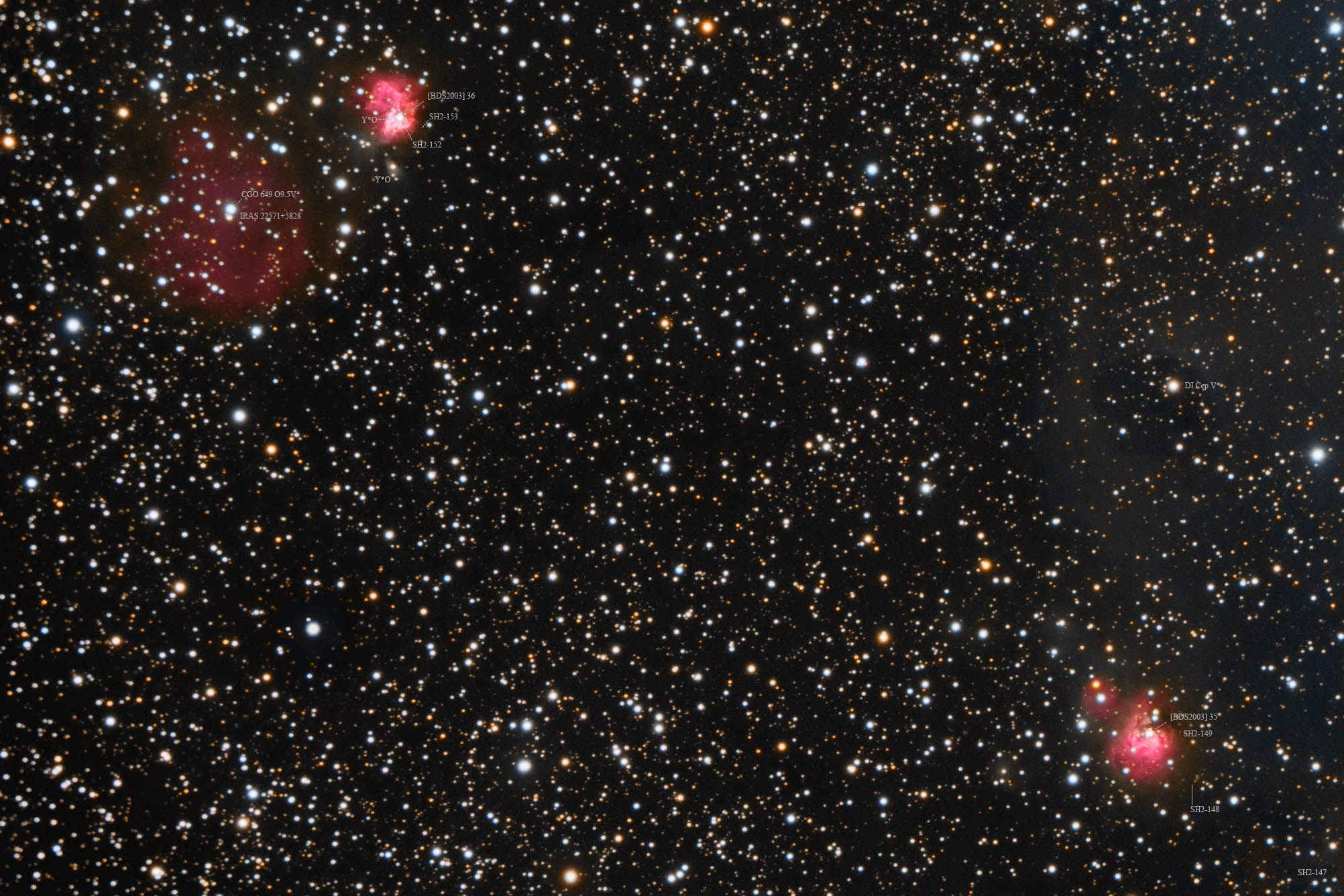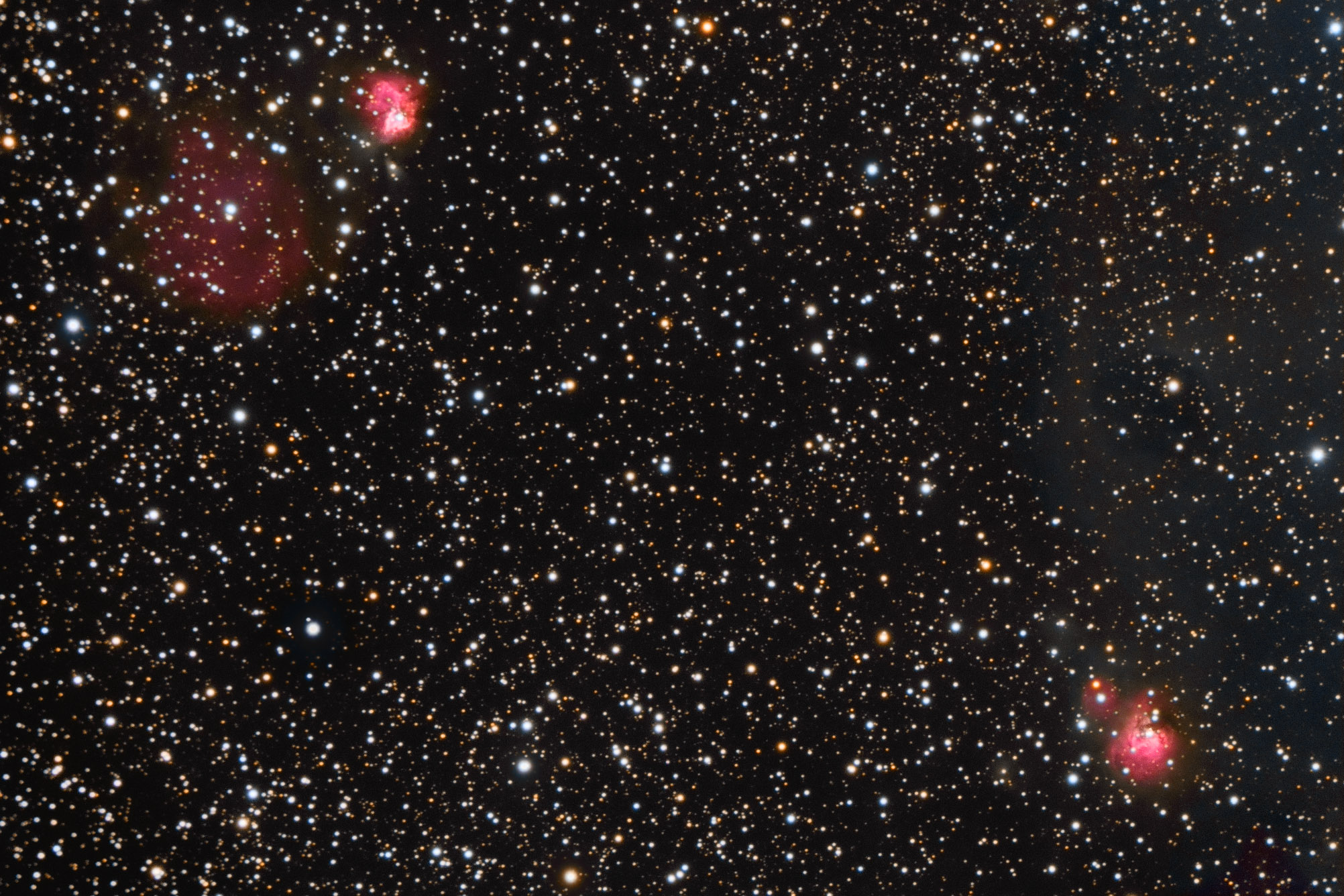Object name: SH2Designation(s): SH2, 147_SH2, 148_SH2, 149_LBN516_SH2, 152_SH2, 153, The region of SH2-147, SH2-148, SH2-149, SH2-152 and SH2-153 form the 2 cores of the 105 thousand solar mass molecular cloud [UUT2000] Cloud A according to galaxymap.org. Though their image of SH2-147 is the wrong nebula. I'd imaged SH2-152 back in 2008 I'd not realized I could have included all these other objects as well. So I reimaged the area in September 2010 then somehow forgot about it. In yet another sweep of the hard drive, it showed up. So this is yet another long-lost image I didn't realize I had. I found a second lost object but it had too poor red and green data so I know why it never got processed but it also never got back on the to-do list either so it sat in limbo as well.
SH2-147, 8 and 9 form one core in the lower right of my image with SH2-149 the bright member. SH2-147 is very faint and mostly off the frame. It would need much more time with a narrow band filter for proper exposure. While SH2-148 is on the frame it is hard to see as well. The annotated image points to its coordinate location. How it's seen as a separate object I don't know. There are other obvious pieces around SH2-149 that I can't find in SIMBAD at all. Some are HII regions other reflection nebulae of some sort (IFN in some cases?). Well above SH2-149 is the variable star DI Cephi. It sits in a dark hole in this large faint nebulosity. Apparently, the dark hole is just a gap in whatever is being illuminated as no dark nebula or bright nebula is listed for this area that I could find.
SH2-152 and SH2-153 seem oddly named since these are normally in Right Ascension order. Like SH2-148, I have trouble seeing SH2-153 as a separate object from the much brighter SH2-152. While the illuminating stars for SH2-149 appears to be a small star cluster [BDS2003] 35 the star cluster [BDS2003] 36 illuminates SH2-152 according to galaxymap. Within the nebula is a young stellar object likely formed from the nebula. Another is nearby to the southeast. See the annotated image. To the southeast of SH2-153 is the large rather faint region apparently caused to glow by CG) 649 a 09.5V star. It is IRAS 22571+5828 as best as I can determine. That object is listed in SIMBAD as a composite object, whatever that means. I have no idea if this object is related to the Sharpless objects or not. Other small reflection nebulae are seen around SH2-152 but I don't find them in SIMBAD.
While the annotated image points to the position that SIMBAD and others use for SH2-153 I can't help but wonder if the large object to the southwest might not be the "real" SH2-153. It seems too obvious to have been overlooked by Sharpless. By the same token SH2-248 is virtually invisible but the small blob to the northeast of SH2-149 is obvious. Could 149 be 148 and the anonymous object 149? I'm pretty ignorant on the Sharpless objects so I may be way off base here. Anyone have better knowledge here? I have seen some amateur images of SH2-152 and 3 that do consider the large faint cloud as SH2-153 but all of SH2-148 seem to point to the area I've noted in the annotated image.
I find little distance information. One paper says 1000 to 3000 parsecs.
My original 2008 image of the SH2-152 region was taken under better seeing but my color processing was poor or the data was poor. I don't know which. It is listed under SH2-152 and SH2-153.
14" LX200R @ f/10, L=4x10' RGB=2x10', STL-11000XM, Paramount ME Related Designation(s):2MASX J04403475+5027419, 2MASX J23050983+6014560, 6C B043646.6+502153, 7C 0436+5022, 87GB 043647.6+502152, 87GB 230304.2+595825, 87GB[BWE91] 0436+5021, 87GB[BWE91] 2303+5958, IC 1470, NGC 1624, NVSS J044036+502744, NVSS J230510+601438, SHARPLESS 212, TXS 2303+599, [GMT2008] IR 23030, [KC97] G110.1+00.0, [KC97] G155.4+02.6, [WB92] 0436+5021, [WB92] 2303+5958, [ZHB90] G110.109+00.047, | | 
